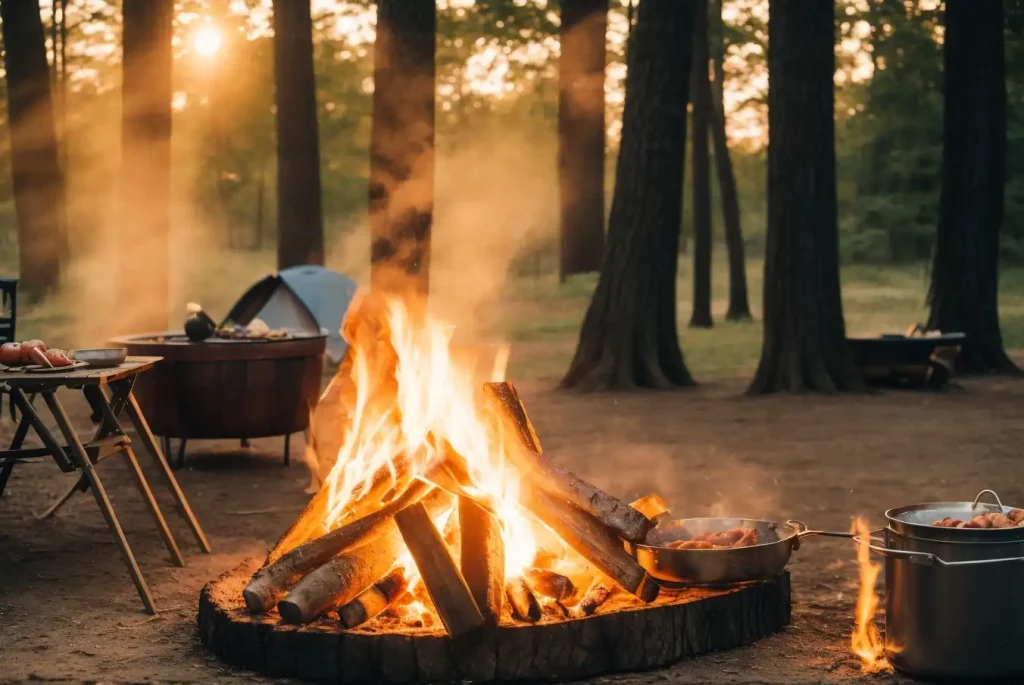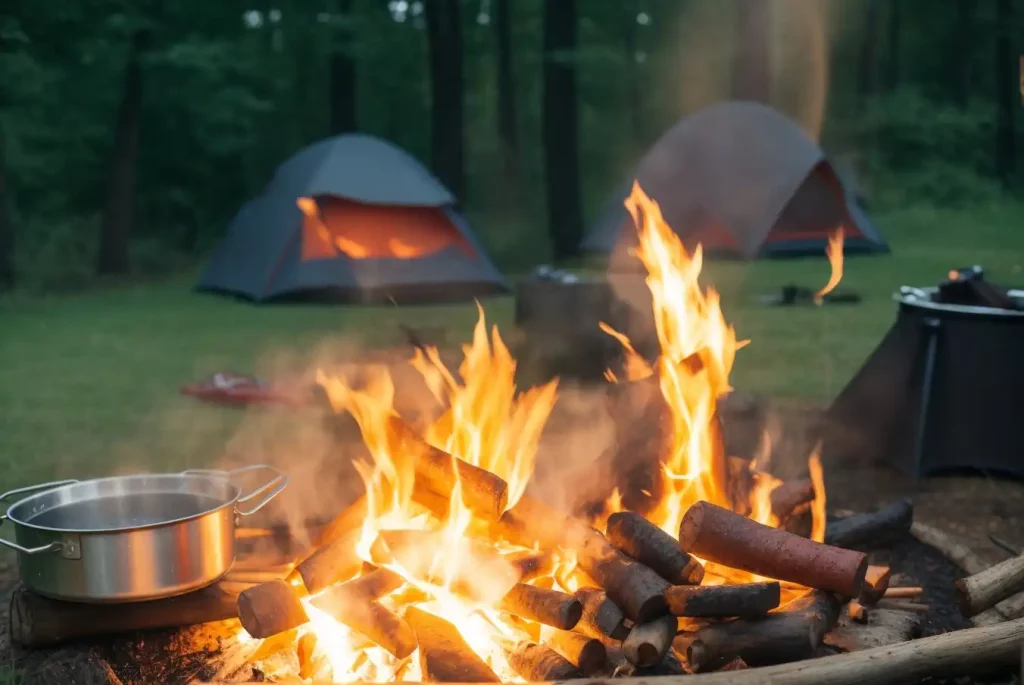Hey there, outdoor lovers! So, you've got your camping gear ready and now you're pondering one of the classic questions — Coals or Wood, what's the best fuel for your campfire?
Honestly, both have their merits, and it really depends on what you're looking for.
Are you aiming for a quick burger or planning a long, dreamy night roasting marshmallows?
Let's dig into this smokin' hot topic and figure out what's the best fit for your next outdoor adventure.
Sit tight and let's get started! You're in for a treat!
The Case for Coals
Before we go all-in on wood, let's chat about why coals might be your go-to fuel.
Types of Coals
Lump Charcoal
If you've got a taste for the organic, lump charcoal is your guy.
It's made from hardwood and contains no additives.
Great for grilling steaks to perfection with a touch of smoky flavor.
Keep in mind, it burns hot and fast, so you better have those tongs ready!
Briquettes
Briquettes are the reliable cousins of lump charcoal.
They're made from compressed sawdust and usually have some additives to help them light and burn consistently.
Briquettes are perfect for those slow-cooked ribs you've been craving.
Advantages of Using Coals
Quick Heating Time
Listen, we all know the struggle—arriving late at the campsite and starving!
In such times, coals are a lifesaver.
They heat up super quick, usually in about 10-15 minutes, and you're good to go.
Consistent Temperature
Once they're hot, coals stay hot.
That consistent temperature means you're less likely to undercook or overcook your food.
It's almost like having a stovetop in the great outdoors!
Easier Cleanup
When it's all said and done, coals turn into a fine ash, making cleanup pretty straightforward.
No need to douse the fire, just let it burn out and sweep away the ash.
Disadvantages of Using Coals
May Contain Additives
If you're using briquettes, watch out!
Some brands use additives like lighter fluid that can give your food an unpleasant chemical taste.
Always opt for the “natural” or “organic” labels if you can.
Non-Renewable Resource
Let's get real for a moment.
Charcoal is made from trees, and the production process isn't exactly Mother Nature friendly.
So, if you're conscious about your environmental footprint, this is something to ponder.
Alright, folks, we've just scratched the surface on the coals.
Learn more: Campfire Grilling Techniques

The Case for Wood
Alright, let's switch gears and talk about wood.
Yeah, the OG fuel that's been keeping us warm and cooking our meals for millennia.
It has a rustic charm that some folks swear by.
Is it the best for you?
Let's see what wood brings to the (picnic) table.
Types of Wood
Hardwoods (oak, hickory)
First up, we've got hardwoods like oak and hickory.
These bad boys are dense and burn hot and slow.
If you've got a penchant for smoked meats, this is the wood for you.
Their complex flavors are unmatched and will make your tastebuds dance.
Softwoods (pine, cedar)
On the flip side, there are softwoods like pine and cedar.
But hold your horses—these are usually better for kindling than cooking.
Softwoods can produce a lot of creosote, which might ruin your food with a bitter taste.
Just use them to get the fire going and switch to hardwoods for the actual cooking.
Learn more: Direct vs Indirect Cooking Methods
Advantages of Using Wood
Renewable Resource
Here's where wood has a leg up on charcoal.
Trees are renewable, and if you're sourcing from a sustainable forest, you're basically guilt-free!
Mother Nature gives it a thumbs up.
Adds Flavor
Forget artificial flavorings and marinades.
Different types of wood offer a range of unique flavors, from the sweet applewood to the robust mesquite.
It's like each tree has its own secret recipe to offer!
Multipurpose Use (smoking, grilling, etc.)
Wood isn't a one-trick pony.
You can use it for smoking, grilling, or even just a cozy bonfire.
And let's not forget, nothing beats the sound of wood crackling on a cool night.
Disadvantages of Using Wood
Takes Longer to Ignite
Now, let's be real—wood can be a bit of a diva when it comes to lighting up.
It takes a bit more effort and patience.
No quick fixes here, but hey, it's part of the rustic experience, right?
Variable Heat
Remember how we praised charcoal for its consistent heat?
Well, wood can be a bit unpredictable.
Different types, sizes, and moisture levels can result in fluctuating temperatures.
So, you might need to play firefighter a bit and manage your logs to keep that heat where you want it.
So there you have it! We've covered the ins and outs of wood as a fuel for your outdoor adventures.
Also know: Smoke Signals: Infusing Flavor with Wood Chips
Comparing the Two: An Analytical Perspective
So, we've got the low-down on both coals and wood.
But which one really takes the cake?
Let's pit them against each other in a head-to-head showdown, shall we?
I'll give you the rundown on cost, environmental impact, and versatility.
Trust me, this is the meat and potatoes of the article.
Cost-effectiveness
Alright, let's talk money.
Everyone loves a good deal, right?
Short-term vs. Long-term Expenses
Coal usually comes pre-packaged and is pretty convenient.
It’s often cheaper in the short term but think about it—you'll be buying those bags regularly.
Those small expenses can add up over time.
Wood, on the other hand, can be an investment.
If you've got access to free wood (always ethically sourced, of course), you're golden.
Even if you have to buy it, a good stockpile can last a while.
So, in the long run, wood might be the wallet-friendly option.
Environmental Impact
We all want to do our bit for the planet, right?
So let's see how our choices measure up.
Carbon Footprint and Sustainability
Coal production isn't the greenest process.
It often involves deforestation and contributes to greenhouse gas emissions.
Plus, it's a non-renewable resource.
Wood is renewable, and if you're careful about sourcing it responsibly, it can be a more sustainable option.
But remember, it can also contribute to deforestation if not managed well.
The takeaway?
Be smart about your source.
Versatility
Are you a one-pot meal kind of person or a gourmet chef in the making?
Which Option Offers More Versatility in Cooking Techniques?
Coal offers a consistent, hot fire, which is great for grilling.
It's the go-to for a classic BBQ.
But if you want to smoke your food, you'd need to buy wood chips separately, which is an added expense and hassle.
Wood is the jack-of-all-trades here.
You can grill, smoke, or even bake with it.
Each type of wood adds its own flavor, making every meal a new experience.
So if you like mixing it up, wood might just be your guy.
And that wraps up our side-by-side comparison.
Up next, we'll get into some expert tips on choosing the right fuel for different types of cooking.
Recommendations
So, you've gotten the full scoop on coals and wood.
What's next? I'll make it simple for you, breaking down which fuel reigns supreme in various scenarios.
I'll even crown an overall champ for you.
Let's dive in!
Scenario-based Recommendations
Different strokes for different folks, right?
Let’s see which fuel wins the day based on your plans.
Camping
If you're heading to the great outdoors, wood is your best buddy.
It's natural, abundant, and you can use it for more than just cooking—like a lovely campfire.
Plus, who can resist that smoky aroma wafting through the pine trees?
Home BBQ
For those lazy Sunday afternoon BBQs, coal is king. Why?
It heats quickly and keeps a consistent temperature.
So you can nail that perfect sear every time.
Smoked Meats
If you're into smoking meats, then wood is the way to go.
Different types of wood bring different flavors, turning every smoked dish into a culinary masterpiece.
Quick Grilling
Got some burgers and hot dogs for a quick evening meal? Coal is your guy.
It heats fast and is less fuss.
Overall Best Choice
If I had to pick just one?
It's a tough call, but wood takes the cake for me.
It's versatile, it's a renewable resource, and the flavor variety is just unbeatable.
Conclusion
Alright, we've been through the wringer comparing coals and wood.
You're armed with the knowledge, and now it's time for you to make the call.
Go on, experiment a little!
Life's too short for bad BBQ.
Whether you choose coals for that consistent heat or wood for its multipurpose charm, the most important thing is that you enjoy the process.
So get out there, fire up that grill or campfire, and make some mouthwatering memories!


